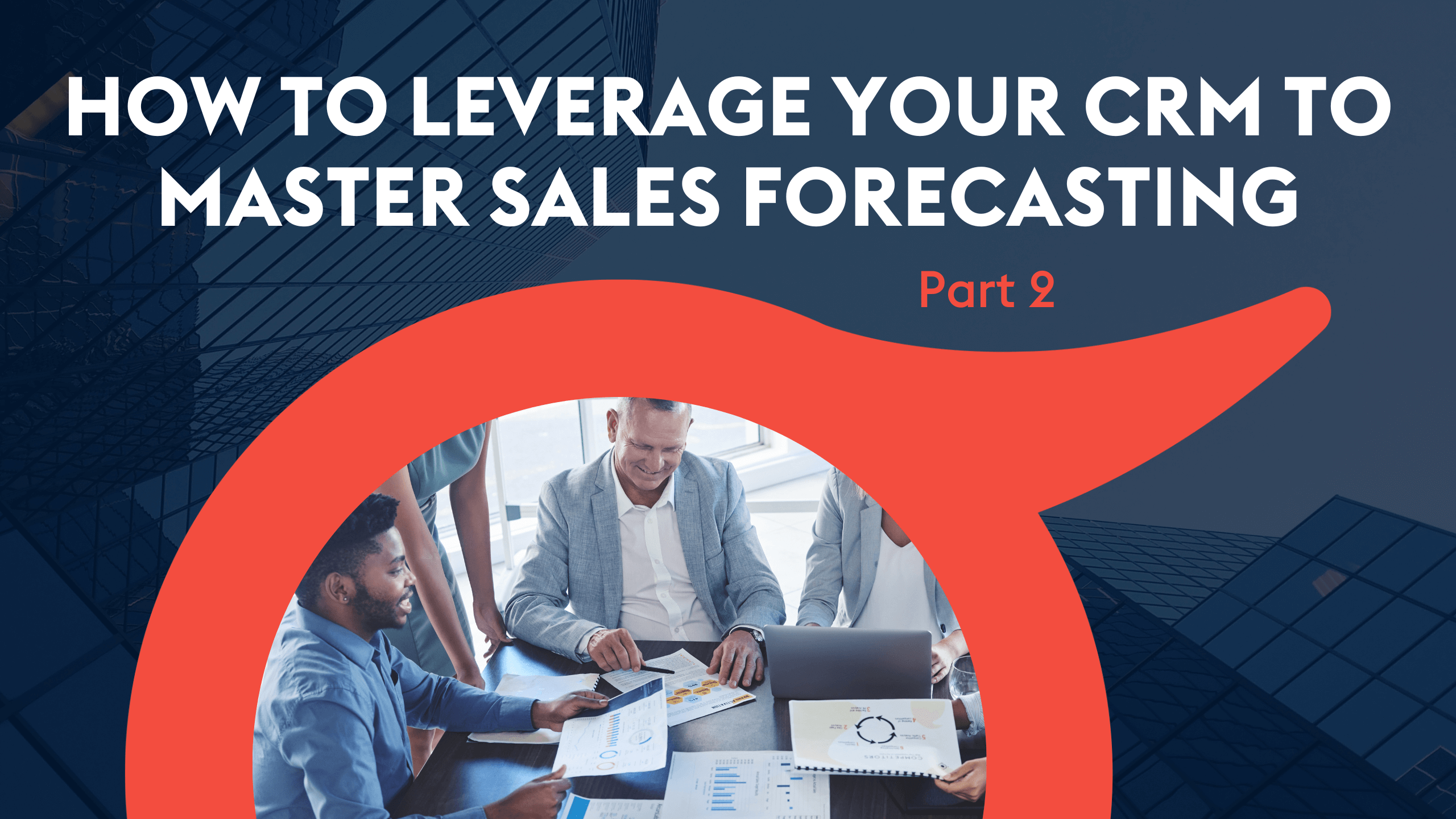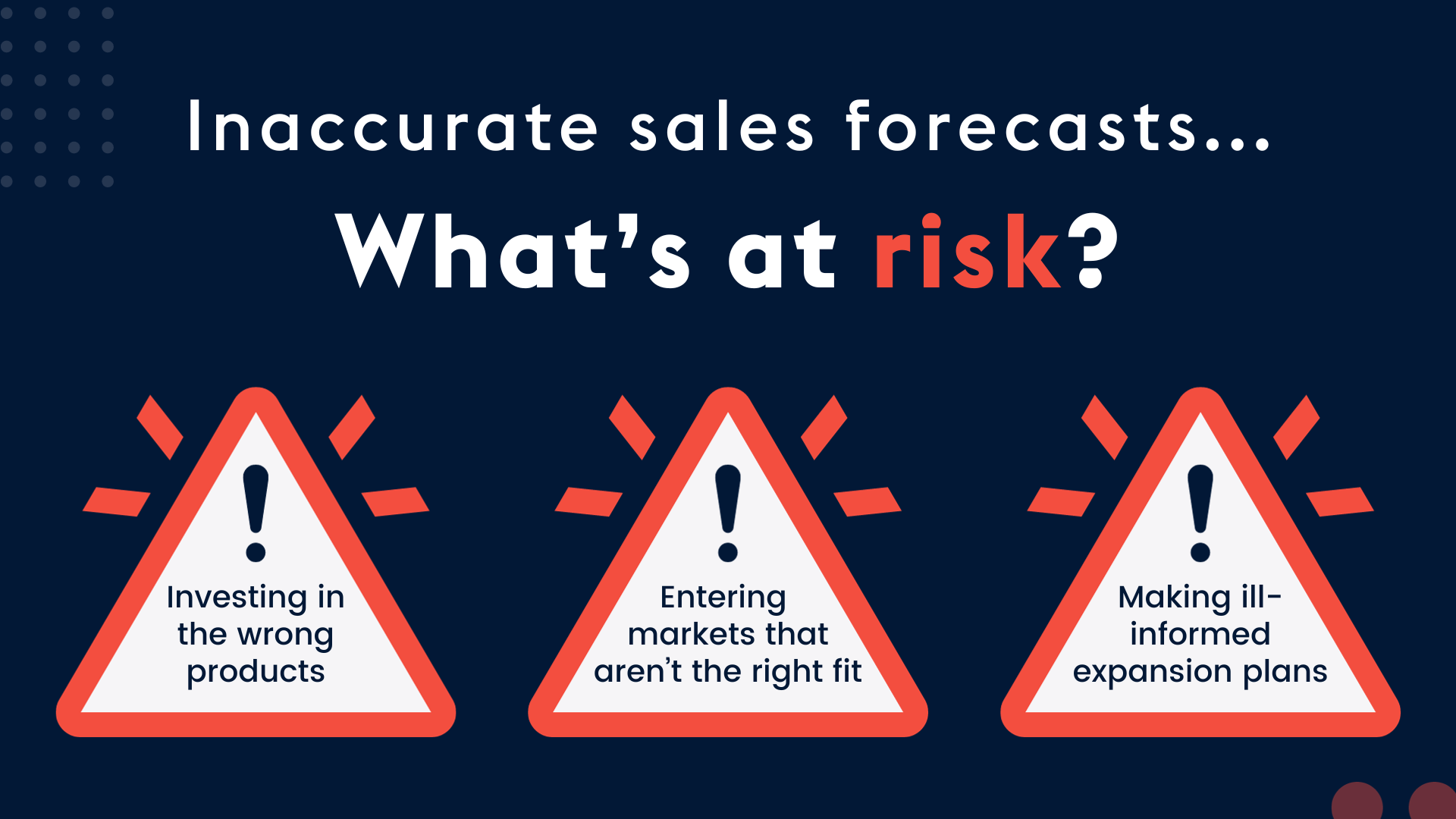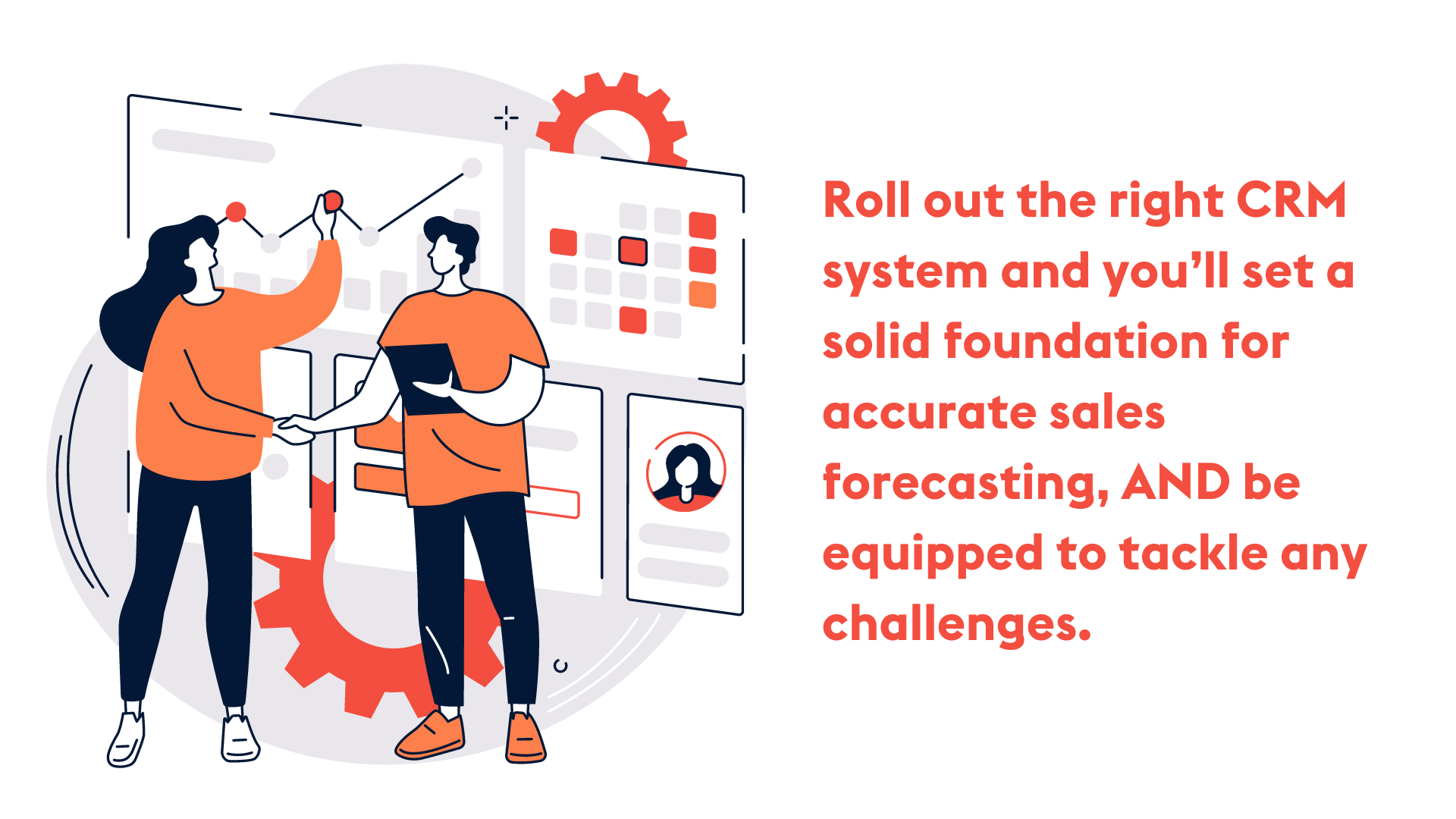
A proper CRM solution is the beating heart of your business. It lets you manage your customer data, understand what (on Earth) is going on in the market, and refine your forecasting models — sales, crucially, but also any other factors that you need eyes on.
With a CRM system you can rely on, you’ll be set to respond effectively to the business challenges your teams will inevitably face, and use data to drive decisions that will move you towards growth and success. That’s the big picture. Here, we’ll zoom in on one aspect: how a solid CRM enhances your sales forecasting accuracy.
In my previous article, I shared why accurate sales forecasts are essential for better business decisions, how to choose the right forecasting model for your business, and how to tailor your CRM to suit your chosen model. If that’s the right starting point for you on this topic, do have a read of part 1 first!
This time, we’ll look at common challenges businesses face when they don’t forecast sales accurately (and — you guessed it — how to overcome them with the right CRM). I’ll also share more on our way of working at Provident CRM, to get you sorted with a CRM that sets your people up for success.
Each industry has its quirks, of course, but there are common, major challenges businesses face when they don’t forecast sales accurately. Let’s take a quick tour of the drawbacks that proper forecasting will prime you to avoid:
1) Uninformed decision-making
Fundamentally, inaccurate sales forecasts can lead to misguided decisions. Without a reliable forecast, you risk:
Detrimental potential outcomes, to put it mildly. But they’re avoidable — or, at the very least, can be vastly mitigated — if your people can rely on accurate sales forecasts via your CRM.

2) Operational inefficiencies
If your sales forecasts are significantly off, you’ll struggle to efficiently allocate your resources. We’re talking your physical resources, human resources, funds and hours, business-wide.
To take one aspect of this as an example: overstaffing could lead to increased costs, while understaffing could negatively impact your service quality. With bang-on sales forecasts, though, those inefficiencies just won’t happen.
3) Missed revenue targets
Perhaps the most gut-wrenching of impacts is inaccurate sales forecasts’ negative effect on your firm’s financial performance. Serious in itself, it also leads to:
4) Ineffective marketing campaigns
Planning marketing campaigns effectively hinges on accurate sales forecasts. If your forecasts are off, your marketing efforts haven’t a hope of aligning with real demand. It’s easy to trace how that often means wasted resources and lower ROI! Don’t waste marketing time and money; get your sales forecasts in gear first.
5) Negative impact on employee & stakeholder morale
In my experience, this aspect isn’t spoken about anywhere near often enough.
Frequent mismatches between your forecasts and actual sales results can lead to frustration for your employees. In your sales team, of course, but also rippling beyond it. Inaccurate forecasts set unrealistic expectations, which shrink motivation and morale when missed, and so it can spiral… but with proper forecasting, the whole picture changes. Targets should be ambitious, yes, but realistic. With the right CRM, you’ll have solid data to set them; essentially creating a springboard for a healthy, successful sales culture. Let’s make that ripple effect a positive one!
Inaccurate forecasts can also strain relationships with your stakeholders: investors, lenders, partners, and so on. Disappointment and demotivation have no place here, either. Yet businesses that consistently miss projections will struggle to build and maintain trust with their stakeholder network. And it’s not just about the forecasting inaccuracy itself. All the factors we’ve touched on above become legitimate follow-on causes for stakeholder concern: uninformed decision-making; operational inefficiencies; missed targets; ineffective marketing campaigns.
Do your sales forecasting right, rooted in a trusty CRM system, and these risks fade away.
Mixed within and between the challenges above, do bear in mind these few factors:
Data quality
Inaccurate, incomplete or inconsistent data lead, of course, to unreliable forecasts. Precision at every stage is essential. This starts with setting up your CRM data processes right:
Poor-quality data don’t just misguide your decisions. They can also skew your historical patterns and disrupt your CRM forecasting modules’ functionality. So data quality is always top of our team’s mind — it’s the bedrock of the CRM that your business needs.
Lack of historical data
Your recent data might be pristine, but scarce historical data could still cause issues if you’re introducing new products, or entering new markets. It hinders your ability to use traditional forecasting methods (a time series model, say).
Lacking historical data will always bring up major question marks. However, if you’ve been using accurate sales models in other business areas or markets, you will have a decent bank of reference data to guide your expansion into uncharted territory.
Market volatility
Rapid shifts in market conditions (such as economic factors and tech advancements) and competitive landscapes can make it tricky to accurately predict future trends. They might lead to sudden changes in demand, meaning you’re playing catch-up to align production, marketing campaigns or inventory strategies with actual market activity.
Changes in consumer behaviour
Cultural shifts, social media trends, tech disruption… you’ll know best what nudges your customers’ preferences and buying patterns to evolve. Any rapid changes in their behaviour can unexpectedly shift demand, meaning insights you might have gathered from your historical data rapidly lose relevance. Staying on top of consumer behaviour shifts means you can account for these in your forecasts, consistently notching up their accuracy.
Roll out the right CRM system, and you’ll set a solid foundation for accurate sales forecasting. You’ll also be equipped to tackle the related challenges we’ve just outlined. Here’s my brief take on how:
Data quality enhancement & real-time data integration: Interlink info across your teams’ systems, boosting clarity, transparency, collaboration, and many more handy things. This also boosts your ability to track and monitor historical and incoming data.
Centralised knowledge management: Lighten workloads and create more lightbulb moments with centralised insights. Even if your people aren’t all using your CRM as their main interface (your finance team’s go-to, for example, might be your ERP), the right integrations will mirror updates across all your systems.
Advanced analytics & machine learning: The more data you put into your CRM over time, the more it will be able to tell you about your customers, their demographics, locations and lines of business, the products they buy and how often, etc. You’ll segment your audience better, leading to enhanced personalisation and resonance (for both B2B and B2C).
Avoid hitting a cost barrier in the future: Planning for future (predicted) data volumes and integration needs is key to getting the ROI that you should on your CRM. We guide all our clients to do this, and also:

At Provident CRM, we get businesses set up with the CRM they need. Only when CRM platforms are properly tailored to you can they be transformational. So that’s what we do:
1) We get to know you and your business
Understanding your business model, existing customers and target audiences, and why your business is looking for a CRM. To strategise right, we’ll clarify your CRM needs and goals (short- to long-term), as well as the KPIs you’ll be using to gauge your CRM’s efficiency.
2) We map your operational processes
Diagramming your process flows, including:
3) We map your customer journey(s)
For a comprehensive outline of your customer touchpoints, from initial engagement to post-sale. Supporting elevated customer experience and fostering engagement at every phase.
4) We pinpoint your data & integration needs
Which data do — and don’t — need to live in your CRM? We scope integration needs (with ERPs, accounting software, e-commerce platforms, etc.), to shape the data migration, entry and storage strategy that best suits your business. Keeping things as straightforward, secure and cost-effective as can be.
We specialise in guiding companies to select, customise and deploy the right CRM solutions for them. Whether that means CRM for sales, service or marketing, you’ll have a platform tailored to your teams’ needs.
I’ll share a little on our ways of working here, which we’re resolute about as we repeatedly hear they add value for our clients:
Expert data migration — the big one
Migrating your existing customer data to a new CRM can be complex. And you’ve got to get it right. Whatever the systems in your current tech stack, and the depth (and disorder!) of your historical data, we’ll shape a migration plan that’ll give you peace of mind.
Customisation for your business goals
Day in and day out, our team tailors CRM systems to suit (and elevate, where it can) our clients’ business processes, objectives and workflows. Ensuring your CRM system works with and for you, taking a load off your plate.
Efficient implementation
We’ll phase your implementation based on its complexity, and be on hand to guide you and your teams through each stage. Adapting to your business reality and CRM needs, and finding the most efficient and cost-effective path ahead.
Integrations
You, like the majority of our customers, likely use multiple software solutions across your business functions. We’ll help you integrate them with your new CRM, guiding you to suitable off-the-shelf plug-ins where they’re available, and implementing bespoke integrations for you where they aren’t. Whichever systems you’re running on, we’ll create a seamless, secure ecosystem that improves your data flow and minimises manual tasks across your teams. Sorted!
Scalability
As your business grows, your CRM will need to evolve. Firstly, we’ll plan for this with you. As we touched on above, this forward-thinking is vital to avoid future cost barriers. We’ll also support you in scaling your CRM to accommodate increasing customer data, more users and wider functionality, always ensuring it continues to support your business objectives and users. Their ongoing buy-in is the key to keeping quality data going into your CRM, after all.
Training and ongoing support
We’ll train your people on your new CRM, sharing the ins and outs of its customisation to your business, plus best practices and shortcuts. This boosts any new CRM’s uptake, which is essential for you to see the ROI you’ll want. It also helps ensure your new workflows will be followed, and that the right data will end up in the right locations, creating the right reports and forecasts, and so on. We’ll also be there to troubleshoot any issues you might encounter, consistently ensuring you’re getting maximum value out of your CRM. Likewise, we’ll guide you on wisely updating your CRM system as new versions and features are released (think AI, ML and more).
Our team’s ready to put decades of CRM experience to work to see your business thrive with the right CRM for you — expertly implemented, and introduced to your employees with tact and empathy. We’re here to see you forge stronger customer relationships, streamline your operations and processes, and unlock new avenues for expansion. That’s what CRM done right can do!
Let us know your CRM needs — across sales forecasting and more via the link below.